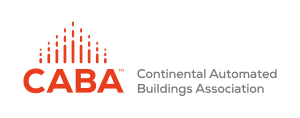Continental Automated Buildings Association CABA
Contents |
[edit] Introduction
The Continental Automated Buildings Association (CABA) is an international, non-profit association that supports the advancement of intelligent home and commercial building technologies. The organisation’s stated vision is to 'empower connectivity among people, spaces and technology for a better tomorrow’.
Its membership includes organisations involved with the development, production, installation and sale of equipment associated with building automation. Public organisations, including utilities and government entities, are also members.
[edit] History
In 1988, the Continental Automated Buildings Association (CABA) was launched. The organisation was originally the Canadian Automated Buildings Association. Founding members included Bell Canada, Bell-Northern Research, Ontario Hydro, Hydro-Québec, Consumers Gas, Canadian Home Builders’ Association, the Electrical and Electronic Manufacturers Association of Canada, Industry Canada, Minto Developments Inc. and NRCan.
In 2006, the organisation acquired the Internet Home Alliance, a group of technology companies involved in research designed to advance the connected home market.
In 2010, the CABA Research Programme was launched, directed by its Board of Directors. The Programme conducts research for residential systems and large building technologies. Non-members can access the research archive (2014 to 2016) and review report summaries from the organisation’s Public Research Library.
[edit] Additional activities
CABA supports industry dialogue by establishing committees and councils. Some of these groups encourage collaboration between members of the large building sector, industry and government entities and disparate intelligent building technologies. The organisation has also been involved in the creation of open source standards as well as an intelligent building ranking system and other protocols related to interoperability.
[edit] Related articles on Designing Buildings
- Building automation.
- Interoperability.
- Open data - how can it aid the development of the construction industry?
- Smart buildings.
- US Smart Connected HVAC in Commercial Buildings Study 2017.
[edit] External resources
Featured articles and news
ECA Blueprint for Electrification
The 'mosaic of interconnected challenges' and how to deliver the UK’s Transition to Clean Power.
Grenfell Tower Principal Contractor Award notice
Tower repair and maintenance contractor announced as demolition contractor.
Passivhaus social homes benefit from heat pump service
Sixteen new homes designed and built to achieve Passivhaus constructed in Dumfries & Galloway.
CABE Publishes Results of 2025 Building Control Survey
Concern over lack of understanding of how roles have changed since the introduction of the BSA 2022.
British Architectural Sculpture 1851-1951
A rich heritage of decorative and figurative sculpture. Book review.
A programme to tackle the lack of diversity.
Independent Building Control review panel
Five members of the newly established, Grenfell Tower Inquiry recommended, panel appointed.
Welsh Recharging Electrical Skills Charter progresses
ECA progressing on the ‘asks’ of the Recharging Electrical Skills Charter at the Senedd in Wales.
A brief history from 1890s to 2020s.
CIOB and CORBON combine forces
To elevate professional standards in Nigeria’s construction industry.
Amendment to the GB Energy Bill welcomed by ECA
Move prevents nationally-owned energy company from investing in solar panels produced by modern slavery.
Gregor Harvie argues that AI is state-sanctioned theft of IP.
Heat pumps, vehicle chargers and heating appliances must be sold with smart functionality.
Experimental AI housing target help for councils
Experimental AI could help councils meet housing targets by digitising records.
New-style degrees set for reformed ARB accreditation
Following the ARB Tomorrow's Architects competency outcomes for Architects.
BSRIA Occupant Wellbeing survey BOW
Occupant satisfaction and wellbeing tool inc. physical environment, indoor facilities, functionality and accessibility.























